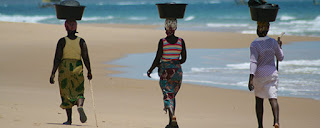Dr. David Sabatini and Philip Deal, a PhD student in the
CEES program, traveled to Ghana in the month of July. The purpose of the trip, supported by the Norman Rotary,
was to evaluate ongoing research, meet with local partners, and act as OU
delegates for the annual WEDC Conference.
 |
| Access Development managers P. Aratuo and W. Mpeniasah with Sabatini and Deal | |
|
The University of Oklahoma has partnered with the Water4
Foundation to research a new company in Wassa East District, Western Region.
The Ghanaian company is called Access Development Ltd. It aims to provide a
full water delivery service to rural communities in Ghana. They will
manufacture drilling equipment and train professional drilling teams. These
teams will dig and maintain boreholes so that contracted villages will have
clean water available on a consistent basis. By following a for-profit model, they
will charge a miniscule tariff for these services upfront at each water point in
order to recover the costs for service and prevent the breakdown of the Access
Development infrastructure. Dr. Sabatini and Mr. Deal met with the leaders of
this company and discussed Phase 1 of project implementation. Phase 1, which
included preliminary planning, mobilization, and baseline studies, was recently
completed. Phases 2 and 3, which include training and the start of drilling,
will proceed this fall.
 |
| Access Development office building in Daboase, Western Region |
 |
| Wassa East District community mapping |
Following the visit
to the local office building in western Ghana, Dr. Sabatini and Mr. Deal headed
to Kumasi to attend the 39th WEDC International Conference. Over 400
participants from over 40 countries participated. The University of Oklahoma
presented a poster over the upcoming research. In addition, other cost recovery
methods were compared and discussed, such as borehole banking, WASH insurance,
and cost recovery for operation and maintenance expenses. The present positive
outlook of service delivery models was apparent in the conference
presentations.
 |
| OU Poster at the 39th WEDC International Conference |
 |
| Safe Water Network water station using a service delivery model |
The
final portion of the trip through Ghana ended in the northern region in a city
named Tamale. Access Development Ltd. has its regional operating center, or
ROC, built in a World Vision compound at this location. The ROC acts as both a
supply chain manager and producer. Skilled technicians are working on a surplus
of pumps, casing, and drilling equipment in preparation for the upcoming work
contracts, as well as providing a manual drilling center for surrounding
countries.
 |
| Regional Operating Center in Tamale, Ghana |
 |
| Storage of manual drilling equipment |
The University of
Oklahoma will be evaluating Access Development Ltd. from technological,
financial, and behavioral perspectives through 2019. Over the next few years,
metrics such as well performance, maintenance periods, operational costs, water
purchasing rates, and how the socioeconomic framework affects the company’s
success will be tracked to evaluate the sustainability of the project. The
WaTER Center will determine if this is the next step in public-private
partnerships in emerging regions.












